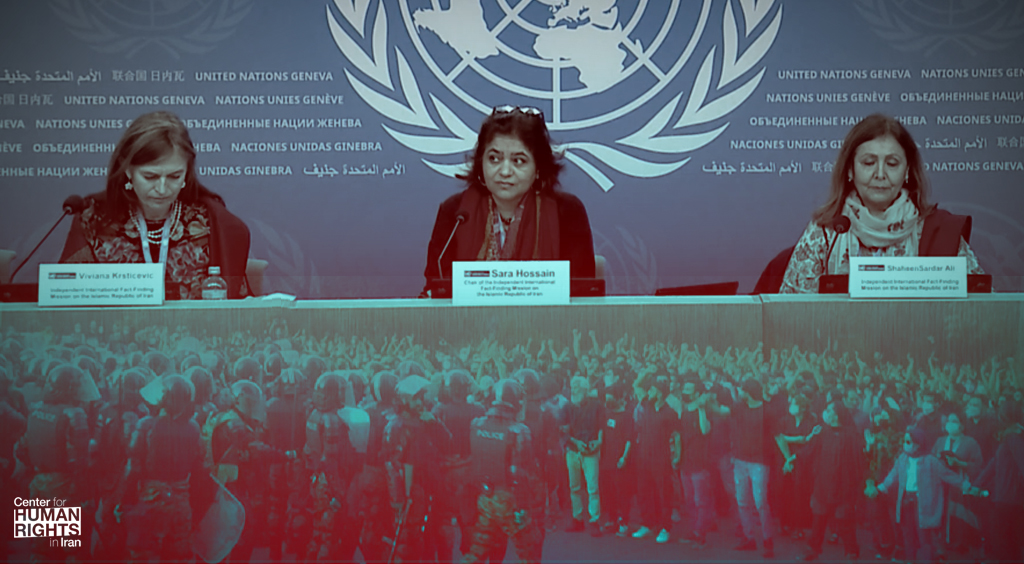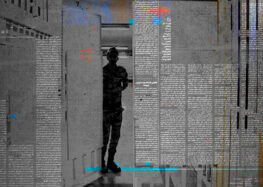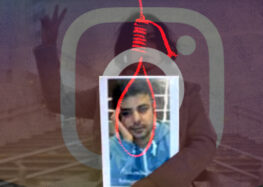Executions, Murder, Rape, Torture Used to Repress “Woman, Life, Freedom” Protests Detailed in 500+ Page UN Report
 Mission Calls on States to Prosecute Responsible Officials Under Universal Jurisdiction
Mission Calls on States to Prosecute Responsible Officials Under Universal Jurisdiction
Crimes Against Humanity: State Atrocities in Iran Revealed in First Report of UN Fact-Finding Mission
March 19, 2024 – Unlawful deaths, extra-judicial executions, disproportionate lethal force, torture, rape, arbitrary arrests, and enforced disappearances were among the many rights violations amounting to “crimes against humanity,” that have been revealed in the detailed inaugural report of the UN’s independent, international Fact-Finding Mission on Iran (FFMI), released today.
“The FFMI found that the protests were largely peaceful yet were met with brutal, militarized force,” said Hadi Ghaemi, executive director of the Center for Human Rights in Iran (CHRI).
“With violent repression and executions continuing in Iran, the renewal of the FFMI’s mandate so that it can continue its work remains more essential than ever,” added Ghaemi.
“All Member States should heed the call of the Fact-Finding Mission to pursue accountability for these state crimes and atrocities through the exercise of universal jurisdiction,” Ghaemi said.
Established by the UN Human Rights Council (HRC) in November 2022 to investigate the Islamic Republic’s violent suppression of the protests sparked in September of that year by the killing in state custody of Mahsa Jina Amini, 22, three days after her arrest for alleged hijab violations, the FFMI has amassed extensive evidence of state atrocities, including the killings of at least 551 protesters, at least 49 women and 68 children, widespread blindings, arbitrary arrests of over 20,000, and the torture and rape of detainees, including children.
To this day, the Islamic Republic of Iran (IRI) continues to take concerted measures to silence victims and families of slain street protesters, who participated in what came to be known as the “Woman, Life, Freedom” movement.
Human Rights Atrocities Unveiled: Brutal Repression and Systematic Violence Against Protesters in Iran
Detailed in a harrowing 581-page exposé, the FFMI’s “Conference Room Paper,” downloadable on the FFMI’s official webpage, sheds light on the egregious human rights violations committed by the Islamic Republic during the 2022 protests in Iran. These include:
- The IRI’s “egregious” human rights violations, which amount to “crimes against humanity,” include murder, imprisonment, torture, rape, and persecution on the grounds of gender, ethnicity and religion.
- These acts were committed as part of a “widespread and systematic attack directed against a civilian population, namely women and girls.”
- The government sought to repress the protests “at any cost.”
- Security forces shot protesters with assault weapons, resulting in credible figures of up to 551 deaths, including at least 49 women and 68 children.
- Security forces used “particularly brutal and militarized violence,” against minority populations, especially in Sistan and Baluchestan, the Kurdish regions, and parts of Western Azerbaijan.
- Security forces targeted the vital body parts of protesters and bystanders, including the face, heads, neck, torso, and genital area, with assault rifles and metal pellets.
- There was a “vicious pattern of ocular injuries” inflicted by security forces on protesters and bystanders, including women and children.
- Women, girls, men and boys were deprived of contact with a lawyer or their families for weeks and subjected to rape, gang rape, rape with an object, beatings, flogging, burning, electric shocks, suspension, and stress positions.
- Judges relied on torture-tainted evidence, dismissed complaints of rape, torture and ill-treatment, and limited defendants to State-approved lawyers.
- At least nine young men were arbitrarily executed by January 2024, without fair trial and due process rights.
- By January 2024, Iranian courts had pronounced at least 26 death sentences against persons in relation to the protests.
A year and a half on since the start of the protests, accountability remains elusive for victims.
The FFMI noted:
“The Government of Iran continues to take concerted measures to silence victims and families who tirelessly continue to seek truth and a modicum of justice. Security forces systematically threatened, intimidated, assaulted, or arrested family members who spoke out to demand justice, or denied their right to mourn their loved ones. Those supporting them, including lawyers and journalists, were also routinely arrested, and prosecuted.”
For these reasons, the Mission underscored the need for accountability for the victims and their families, both at the domestic level in Iran, as well as by Member States who should exercise universal jurisdiction with respect to all crimes under international law without procedural limitations.
Member States should also explore transformative reparations for victims, including through restitution, compensation, rehabilitation, satisfaction and guarantees of non-repetition.
CHRI Executive Director Had Ghaemi was in Geneva this past week, for the 55th session of the Human Rights Council (26 February to 5 April 2024), urging HRC member states to renew the Fact-Finding Mission’s mandate, as well as the mandate of the Special Rapporteur on the situation of human rights in Iran.
The appeal to renew the mandates has been echoed by imprisoned Nobel Peace Laureate and women’s rights defender in Iran, Narges Mohammadi, as well as 43 international human rights organizations.
Read this report in Persian
This report was made possible from donations by readers like you. Help us continue our mission by making a tax-deductible donation.






